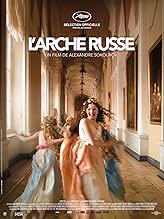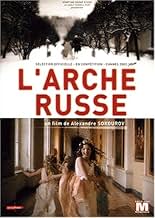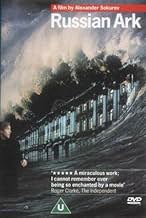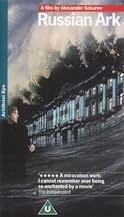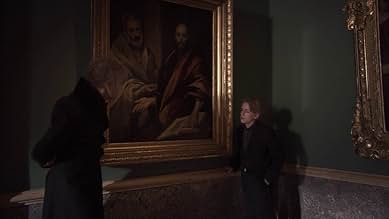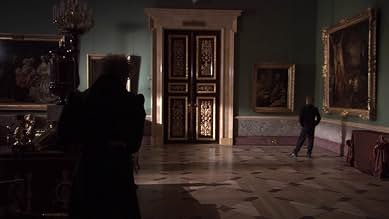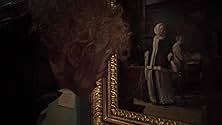Un aristocrate français du 19ème siècle, connu pour ses mémoires cinglantes sur la vie en Russie, parcourt le musée de l'Ermitage de Russie et fait la connaissance de personnalités historiqu... Tout lireUn aristocrate français du 19ème siècle, connu pour ses mémoires cinglantes sur la vie en Russie, parcourt le musée de l'Ermitage de Russie et fait la connaissance de personnalités historiques des 200 dernières années.Un aristocrate français du 19ème siècle, connu pour ses mémoires cinglantes sur la vie en Russie, parcourt le musée de l'Ermitage de Russie et fait la connaissance de personnalités historiques des 200 dernières années.
- Prix
- 10 victoires et 15 nominations au total
Avis en vedette
The film begins in the dark with the narrator (apparently Sokurov) commenting about how little he sees. "My eyes are open", he says, "and yet I see nothing". He does not know where he is but apparently has just died in an accident of some kind. Is this a movie? A play?" he asks. He receives no answer except a vision of 18th century aristocrats moving slowly into the Tsar's palace. An elegant white-haired man in a black cloak (Sergey Dreiden) suddenly appears and escorts the confused narrator into the corridors of the grand palace. "Everyone knows the present, but who can remember the past", says the stranger as they walk from one ballroom to the next, witnessing great works of art as well as ghost-like presences from Russia's past. We see works by El Greco, Rubens and Van Dyck in their awesome splendor. We run into Peter the Great thrashing a general, Catherine the Great looking for the bathroom, and Nicholas II, the last Russian Tsar hosting the Great Royal Ball of 1913, the last such formal occasion of its kind.
As we enter the Great Nicholas Hall, the opulent room is filled with thousands of aristocrats dancing the mazurka in gorgeous period costumes. A full orchestra is playing in the background and young soldiers are nattily dressed in their uniforms. How beautiful it all seems and how it appears they were destined to live forever but we all know how the nasty Bolsheviki spoiled the party. Ah yes, how green was my valley then. Sokurov said he wanted to make a whole film "in one breath" and he has succeeded in simulating the breathing process, pulling us in, then moving us out as we feel the rhythm of our own life beating with the swirl of lost humanity. At the end of Russian Ark, we see the peaceful flow of a river outside the hall to which the narrator comments, "The flow is forever. Life is forever." Having completed the past, our invisible guide is now ready to move into the endless silence that is, in the phrase of the Anglican priest Thomas Kelly, "the source of all sound".
Not knowing a lot of Russian history, some of the scenes didn't make much sense, but I did cotton on to Anastasia being late for tea. Maybe she got away after all. There was nothing from the Soviet era, except a brief scene during the German siege of Lenningrad (a million died, mainly from starvation, and many made coffins for themselves before they expired). This seems appropriate, since the communists contributed nothing to the buildings, which were started by Peter the Great and added to by his successors. A bad fire in 1837 was followed by extensive reconstruction and many of the rooms we see in the film date from that time.
I suppose this is the first film in which the set is the star and the actors merely props. There is in fact one dramatic part, that of the French Marquis who attended the Tsar's court in the 1840s, and who is somehow able to take us backward and forward in time. Even he is a bit two-dimensional, in fact the other, unseen, presence (the voice of the director of the film) is as real.
Towards the end we attend a great ball, and the Marquis gets to dance the Marzurka again. The music is great (is that Glinka conducting something of this own?) and the atmosphere gay (as somebody says `you can't be shy for the Mazurka') and for a moment history is forgotten. But we don't have a plot, the characters are cut-outs (with the exception of Catherine who seems to have been one of the more boisterous Empresses in history) and, basically, nothing happens. Yet I found myself absorbed by it all, occasionally wishing I could click my mouse to zoom in on an interesting painting. Ironically, much of the art is non-Russian, so `Russian Ark' is something of a misnomer `Euro-Ark' is nearer the mark. At the end of the day, though, I am lost with admiration for the cinematographer, who managed to keep his digital camera running and pointed in the right direction for 90 minutes without making a mistake. Madness, brilliant Russian madness.
Russian Ark portrays the Hermitage as a kind of cultural and historical ark floating on centuries of Russian seas. The narrative device is a shadowy eighteenth century Frenchman who wanders the halls and time periods, commenting often with good-natured European condescension on what he sees. He is accompanied by a Russian who is never seen, and who questions him about his comments. The movie ranges through time with appearances of Peter the Great, Catherine II, Pushkin, Nicholas II and his family, generals, maids, flunkies and diplomats. The Frenchman, played with great style by Russian actor Sergei Dreiden, takes us to painting and sculpture galleries, kitchens, ballrooms, storerooms, basements and living quarters as we observe things that happened in the Hermitage over the centuries.
At first, I was very aware of the technical feat of no cuts. Gradually, though, I think most people just relax and accept the skill of the director and photographer, and become immersed in what they are seeing. A kind of unreal imagery takes hold. The movie ends with the last dance held in the Great Ballroom before WWI. Hundreds of actors and dancers, in full costume, swirl around this ornate setting, and swirl around the camera as well, while the camera glides through the crowds. It's a terrific scene, and is followed by the end of the dance with all the hundreds of guests making their way through the halls and staircases to leave the building, with the camera facing them and moving along in front of them.
This is a highly unusual film, probably a great one.
Director Aleksandr Sokurov is the voice of the anonymous inquisitor who accompanies nineteenth century French marquis Sergei Dreiden (Sergei Dontsov) on a breathtaking tour of the physical and spiritual Hermitage of St. Petersburg. He has made a groundbreaking, stunning film. Shot from a Steadycam in one continuous over hour-and-a-half stream, the film explores the treasures of one of the world's greatest museums. Equally, "Russian Ark" rambles, without regard for chronological order, through snatches of Russian and Soviet history, each short episode a fantastical peep into a wild, rich, often terrifying but always fascinating world.
In the nineteenth century European travellers, most often men (Charles Dickens, for example) and some women (Fanny Trollope for one) visited and wrote about the two untamed civilizations that beckoned to foreigners and promised adventure and intrigue: Russia and the United States. Count Dreiden, a not atypical Frenchman of haughty self-assurance and ample means, viewed Russians as boorish and their culture a gilt-splendored front for a nearly barbarous land. His book would not have been picked up by a publisher linked to the travel industry.
In "Russian Ark" Dreiden is more muted than he is in print but his unquestioning cynicism comes through as Sokurov captures the imagined journey in one building of a French nobleman through both his time and a future he questions without developing much understanding.
So we have both an Acoustaguide tour of a wonderful palace of culture and myriad treasures and snapshots of everyone from Catherine the Great to Nicholas and Alexandra and their children, including an adorable Anastasia, fated to be one of history's silly mysteries. Noblemen and contemporary sailors, bemedaled officers and bejeweled women, a cultured woman gallery guide and apparatchiks - they all fleet through and interact with the questioning but stolidly biased Frenchman.
How did Sokurov pull off a continuous take through over 4,200 feet of the Hermitage with a cast of many hundreds, gorgeously costumed, without a hitch? Unbelievable! That feat alone propels him into the Cinema Pantheon of Fame. At times I felt like I was drawn into the crowd, especially when they depart a dance to head for a fabulous banquet (the dance band is conducted by Valery Gergiev, the only famous - to Westerners - person in the film). And even though I knew from reviews that Sokurov pulled it off, I kept waiting for the seemingly inevitable "Cut!" following a miscue or stumble.
The hint of intrigue and menace that is so much part of Russia's past and present lurks behind an almost impressionistic front with scenes of one-dimensional gaiety almost but not entirely hiding a complex society. Sokurov teaches and teases simultaneously.
As visual splendor and directorial innovation this is one of the great films of our time. I look forward to owning it on DVD knowing that its magic can never be realized fully outside a theater.
Don't miss this one and see it more than once.
10/10.
Le saviez-vous
- AnecdotesShot in a single take. The first three attempts were cut short by technical difficulties, but the fourth was successful.
- GaffesMany extras look to the camera and they quickly return to a default mark.
- Citations
The Time Traveller: Sir. Sir. A pity you're not here with me. You would understand everything. Look. The sea is all around. And we are destined to sail forever, to live forever.
- ConnexionsEdited into Spisok korabley (2008)
- Bandes originalesMazurka
(from opera "A Life For The Tsar")
Music by Mikhail Glinka
Performed by Mariinsky Theatre Orchestra
Conducted by Valery Gergiev
Meilleurs choix
- How long is Russian Ark?Propulsé par Alexa
Détails
Box-office
- Brut – États-Unis et Canada
- 3 048 997 $ US
- Fin de semaine d'ouverture – États-Unis et Canada
- 29 022 $ US
- 15 déc. 2002
- Brut – à l'échelle mondiale
- 8 691 860 $ US
- Durée1 heure 39 minutes
- Couleur
- Mixage
- Rapport de forme
- 1.78 : 1
Contribuer à cette page







